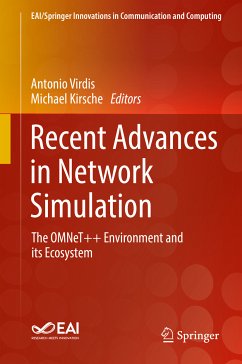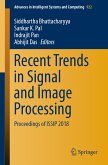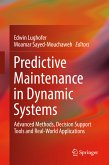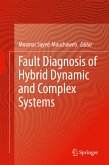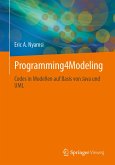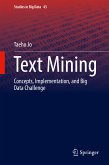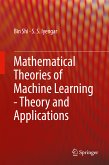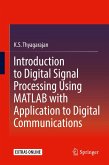Recent Advances in Network Simulation (eBook, PDF)
The OMNeT++ Environment and its Ecosystem
Redaktion: Virdis, Antonio; Kirsche, Michael
120,95 €
inkl. MwSt.
Sofort per Download lieferbar

60 °P sammeln
Recent Advances in Network Simulation (eBook, PDF)
The OMNeT++ Environment and its Ecosystem
Redaktion: Virdis, Antonio; Kirsche, Michael
- Format: PDF
- Merkliste
- Auf die Merkliste
- Bewerten Bewerten
- Teilen
- Produkt teilen
- Produkterinnerung
- Produkterinnerung

Bitte loggen Sie sich zunächst in Ihr Kundenkonto ein oder registrieren Sie sich bei
bücher.de, um das eBook-Abo tolino select nutzen zu können.
Hier können Sie sich einloggen
Hier können Sie sich einloggen
Sie sind bereits eingeloggt. Klicken Sie auf 2. tolino select Abo, um fortzufahren.

Bitte loggen Sie sich zunächst in Ihr Kundenkonto ein oder registrieren Sie sich bei bücher.de, um das eBook-Abo tolino select nutzen zu können.
Includes an introduction to the OMNeT++ simulation framework and its main features
Gives a comprehensive overview of on-going research topics that exploits OMNeT++ as simulation environment
Provides examples and uses cases focusing on the practical aspects of simulation
- Geräte: PC
- ohne Kopierschutz
- eBook Hilfe
- Größe: 14.28MB
Andere Kunden interessierten sich auch für
![Recent Trends in Signal and Image Processing (eBook, PDF) Recent Trends in Signal and Image Processing (eBook, PDF)]() Recent Trends in Signal and Image Processing (eBook, PDF)112,95 €
Recent Trends in Signal and Image Processing (eBook, PDF)112,95 €![Predictive Maintenance in Dynamic Systems (eBook, PDF) Predictive Maintenance in Dynamic Systems (eBook, PDF)]() Predictive Maintenance in Dynamic Systems (eBook, PDF)120,95 €
Predictive Maintenance in Dynamic Systems (eBook, PDF)120,95 €![Fault Diagnosis of Hybrid Dynamic and Complex Systems (eBook, PDF) Fault Diagnosis of Hybrid Dynamic and Complex Systems (eBook, PDF)]() Fault Diagnosis of Hybrid Dynamic and Complex Systems (eBook, PDF)72,95 €
Fault Diagnosis of Hybrid Dynamic and Complex Systems (eBook, PDF)72,95 €![Programming4Modeling (eBook, PDF) Programming4Modeling (eBook, PDF)]() Eric A. NyamsiProgramming4Modeling (eBook, PDF)54,99 €
Eric A. NyamsiProgramming4Modeling (eBook, PDF)54,99 €![Text Mining (eBook, PDF) Text Mining (eBook, PDF)]() Taeho JoText Mining (eBook, PDF)120,95 €
Taeho JoText Mining (eBook, PDF)120,95 €![Mathematical Theories of Machine Learning - Theory and Applications (eBook, PDF) Mathematical Theories of Machine Learning - Theory and Applications (eBook, PDF)]() Bin ShiMathematical Theories of Machine Learning - Theory and Applications (eBook, PDF)70,95 €
Bin ShiMathematical Theories of Machine Learning - Theory and Applications (eBook, PDF)70,95 €![Introduction to Digital Signal Processing Using MATLAB with Application to Digital Communications (eBook, PDF) Introduction to Digital Signal Processing Using MATLAB with Application to Digital Communications (eBook, PDF)]() K. S. ThyagarajanIntroduction to Digital Signal Processing Using MATLAB with Application to Digital Communications (eBook, PDF)48,95 €
K. S. ThyagarajanIntroduction to Digital Signal Processing Using MATLAB with Application to Digital Communications (eBook, PDF)48,95 €-
-
-
Includes an introduction to the OMNeT++ simulation framework and its main features
Gives a comprehensive overview of on-going research topics that exploits OMNeT++ as simulation environment
Provides examples and uses cases focusing on the practical aspects of simulation
Dieser Download kann aus rechtlichen Gründen nur mit Rechnungsadresse in A, B, BG, CY, CZ, D, DK, EW, E, FIN, F, GR, HR, H, IRL, I, LT, L, LR, M, NL, PL, P, R, S, SLO, SK ausgeliefert werden.
Produktdetails
- Produktdetails
- Verlag: Springer International Publishing
- Seitenzahl: 472
- Erscheinungstermin: 21. Mai 2019
- Englisch
- ISBN-13: 9783030128425
- Artikelnr.: 57073227
- Verlag: Springer International Publishing
- Seitenzahl: 472
- Erscheinungstermin: 21. Mai 2019
- Englisch
- ISBN-13: 9783030128425
- Artikelnr.: 57073227
- Herstellerkennzeichnung Die Herstellerinformationen sind derzeit nicht verfügbar.
Antonio Virdis is an Assistant Professor at the University of Pisa, Italy, where he obtained his MSc degree in Computer System Engineering in 2011, and his PhD in Information Engineering in 2015. His research interests include Quality of Service (QoS), scheduling and resource allocation in wireless networks, network softwarization, network simulation, and performance evaluation. He has been and is currently involved in national, EU-funded, and industry-funded research projects. He coauthored seven patents and more than 40 peer-reviewed papers in the field of cellular network modeling and algorithms. He has served as a member of the technical program committee of various international conferences, he served as TPC co-chair of the International OMNeT++ Community Summit in 2016 and 2017, and as a local organizer in 2018. Michael Kirsche is an external PhD student at the Brandenburg University of Technology Cottbus-Senftenberg, Germany. He obtainedhis MSc degree in Information and Media Technology in 2009, for which he received the 2009 Alumnus Award of the federal state of Brandenburg, Germany. He worked as a project manager for 2 years before pursuing his PhD in Computer Science. His research focus lies on the integration of sensor networks into the Internet and the simulation and modeling of wired and wireless sensor networks and Internet of Things (IoT) protocols. He is currently working in the industry in the areas of fieldbus protocols and deterministic railway communication networks. He coauthored eighteen peer-reviewed papers and journal articles in the field of communication networks and protocols, collaborative computing, and network simulation. He is serving as a member of the International OMNeT++ Community Summit organizing committee since the event's reinvention in 2014.
Chapter1: A Practical Introduction to the OMNeT++ Simulation Framework.- Chapter2: INET Framework.- Chapter3: INETMANET Framework.- Chapter4: RINASim.- Chapter5: Cellular-Networks Simulation using SimuLTE.- Chapter6: Veins - The Open Source Vehicular Network Simulation Framework.- Chapter7: SEA++: A Framework for Evaluating the Impact of Security Attacks in OMNeT++/INET.- Chapter8: Simulation Reproducibility with Python and Pweave.- Chapter9: Live Monitoring and Remote Control of OMNeT++ Simulations.- Chapter10: Simulation of Mixed Critical In-Vehicular Networks.- Chapter11: LIMoSim: A Framework for Lightweight Simulation of Vehicular Mobility in Intelligent Transportation Systems.- Chapter12: Artery - Large Scale Simulation Environment for ITS Applications.- Chapter13: Simulating LTE-enabled Vehicular Communications.- Chapter14: Simulating Opportunistic Networks with OMNeT++.- Chapter15: openDSME -Reliable Time-Slotted Multi-Hop Communication for IEEE 802.15.4.
Chapter1: A Practical Introduction to the OMNeT++ Simulation Framework.- Chapter2: INET Framework.- Chapter3: INETMANET Framework.- Chapter4: RINASim.- Chapter5: Cellular-Networks Simulation using SimuLTE.- Chapter6: Veins - The Open Source Vehicular Network Simulation Framework.- Chapter7: SEA++: A Framework for Evaluating the Impact of Security Attacks in OMNeT++/INET.- Chapter8: Simulation Reproducibility with Python and Pweave.- Chapter9: Live Monitoring and Remote Control of OMNeT++ Simulations.- Chapter10: Simulation of Mixed Critical In-Vehicular Networks.- Chapter11: LIMoSim: A Framework for Lightweight Simulation of Vehicular Mobility in Intelligent Transportation Systems.- Chapter12: Artery - Large Scale Simulation Environment for ITS Applications.- Chapter13: Simulating LTE-enabled Vehicular Communications.- Chapter14: Simulating Opportunistic Networks with OMNeT++.- Chapter15: openDSME -Reliable Time-Slotted Multi-Hop Communication for IEEE 802.15.4.
